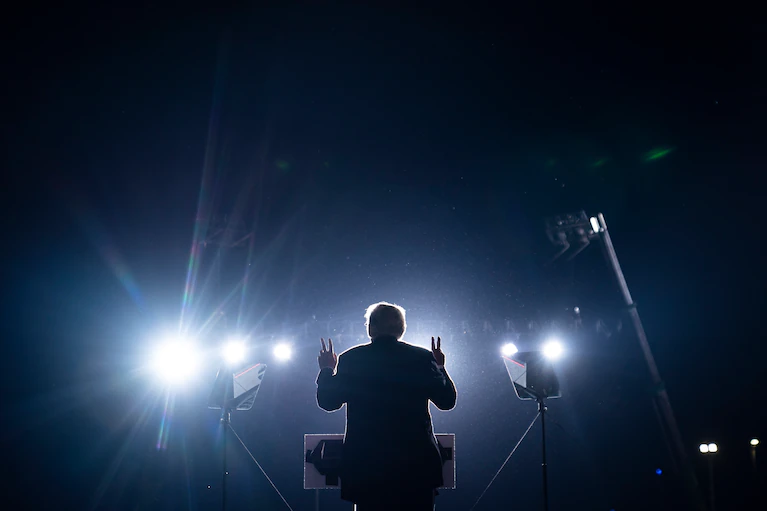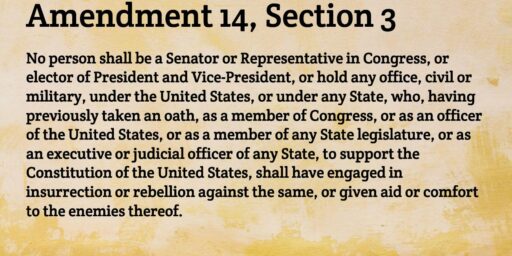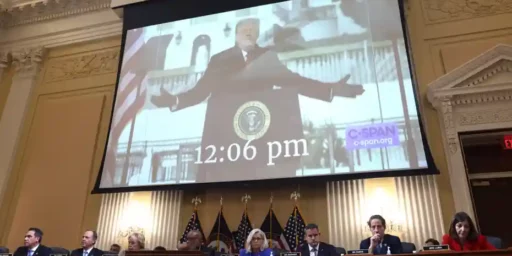The 14th Amendment, Section 3
Trump betrayed his oath. That should disqualify him from office. That's the whole point of section 3 of the 14th.

As James Joyner notes, another state has asserted that Donald J. Trump engaged in insurrection against the United States and therefore is not eligible to run for federal office. I agree with him that the likely outcome of this process is that the US Supreme Court will allow Trump to be on the ballot. But after having given this considerable thought, I am no longer convinced that such a decision would be the constitutionally correct one.
In simple terms, I do believe this is a qualification issue, like age and natural-born status. If it can be legally established that Trump engaged in insurrection, then I think that constitutional language (which we will get to) is clear: it means he is ineligible to serve.
Note that this is not a criminal or civil penalty. He is not losing his freedom nor having to pay a fine or restitution. It is no different than establishing that a candidate was born in Canada, not the United States, and therefore is ineligible to hold the office and therefore should not be allowed on the ballot. It is not a punishment, it is a matter of fact. (I acknowledge that the fact of birthplace is easier to establish than that of insurrectionist status).
I will note that I am still open to the argument that the normatively best outcome is for him to be allowed to run and lose in the election. But I also think that there is a significant risk that the Electoral College (as opposed to the will of the voters) will allow Trump to return to power, and that, specifically, section 3 of the 14th Amendment exists to prevent such an outcome. I think that it was written not only to deal with the aftermath of the US Civil War but also to establish a general constitutional principle: that a person who swears an oath to the United States and then participates in an insurrection or rebellion against the government they swore to uphold, should be forever barred from again serving in such a capacity.
The entire reason to have such a clause is that, in the aftermath of a rebellion, you do not want it to be possible for the defeated rebels to then find a way into power so as to subvert the state from within. Definitionally there will be sympathizers to a failed rebellion present in the populace even after the conflict is over. It is foolish to leave an open door for a return to power for someone who failed to uphold their oath.
If you fired an accountant for embezzlement and then found his application in the pile to fill the vacancies they left behind you would rightly throw it in the garbage.
Let’s look at the text.
Section 3
No person shall be a Senator or Representative in Congress, or elector of President and Vice-President, or hold any office, civil or military, under the United States, or under any State, who, having previously taken an oath, as a member of Congress, or as an officer of the United States, or as a member of any State legislature, or as an executive or judicial officer of any State, to support the Constitution of the United States, shall have engaged in insurrection or rebellion against the same, or given aid or comfort to the enemies thereof. But Congress may by a vote of two-thirds of each House, remove such disability.
First, the dodge that since “President” isn’t listed this clause does not apply to POTUS strikes me as utterly ridiculous. It seems patently obvious that the President of the United States is an “officer of the United States.” For an extensive treatment of this topic, see Roger Parloff at Lawfare: “For Whatever Reason”: Will the Colorado Supreme Court Apply the Constitutional Insurrectionist Bar to Presidents?
Second, I see no reason why this clause would only apply to activities during the US Civil War (any more than section 1’s birthright citizenship right applied only to persons born at the time). It strikes me as definitionally true that when a constitution is amended that it is done so for a proximate cause (in this case, quite clearly, to deal with the aftermath of the Civil War) but also takes on a generalized meaning unless the text is specifically limited. The language used is general, not specific, and therefore logically extends to any insurrection or rebellion.
Third, to me, there can be reasonable disagreement, is whether “engaged in” requires a criminal conviction. I initially was of the view that such a conviction was necessary, but have been persuaded by being exposed to numerous arguments that a conviction is not needed, but rather a legal finding of fact is sufficient.
As Adam Serwer noted in The Atlantic (The Colorado Ruling Calls the Originalists’ Bluff).
There is no language limiting the power of the section to former Confederates, however, and its scope is sweeping, with no requirement that those engaged in the specified conduct be convicted. Indeed, given the number of people who served in the Confederate army and governments, such a requirement would have been impractical.
I would note that there was a 5-day bench trial in Colorado district court to determine if Trump engaged in an insurrection wherein evidence was provided and a legal defense entered. The court found him to have engaged in insurrection and ruled that he was eligible to run because section 3 does not include the word “President” (see my point #1 above).
As George Conway noted in The Atlantic (The Colorado Ruling Changed My Mind)
This was a full-blown, five-day trial, with sworn witnesses and lots of documentary exhibits, all admitted under the traditional rules of evidence before a judicial officer, who then made extensive written findings of fact under a stringent standard of proof. Every day in this country, people go to prison—for years—with a lot less process than Trump got here. As for the expeditiousness of the proceedings, that’s in the very nature of election disputes: Recall, once again, Florida in 2000. And Samour’s suggestion that Trump was denied a fair trial because he didn’t have a jury is almost embarrassing: Any first-year law student who has taken civil procedure could tell you that election cases are not even close to the sort of litigation to which a Seventh Amendment jury-trial right would attach.
Fourth, since Congress can lift this sanction, it seems not at all unreasonable for the courts of Colorado to have made their determination and for the remedy to be Congress’ to provide. Indeed, that is how the amendment plainly reads.
I cannot stress enough that the language is pretty straightforward.
Let me conclude by highlighting that I utterly understand concerns that removing Trump from the ballot via this process could further exacerbate polarization in the country, and therefore it is risky. I can, therefore, understand why there might be a preference that it not unfold in such a manner. At any given moment, I am persuadable of that position.
But I also think that the language of section 3 is exceedingly clear. If it can be determined (and it legally has in Colorado, at a bare minimum) that Trump engaged in insurrectionist activities, he is constitutionally barred from holding federal office. And such an outcome would be just in my mind, as he swore to uphold federal law and to protect and defend the Constitution and then brazenly tried to betray that oath while in office.
He disqualified himself by those actions, plain and simple.






FWIW, my thinking and the journey it has taken mirrors yours exactly. I don’t know if this is a good thing or not, but it seems valid as per the amendment.
I agree. Disqualification by a self-executing 14th Amendment is a perfectly legitimate, valid interpretation of Section 3. However, it is by no means the “right” or “correct” answer because these waters are as uncharted as they get. Mr. Trump is, among other things, an incredibly selfish man for bringing the country to this point with not a care as to how the country will be impacted.
We’re pretty much on the same page, Steven. I don’t see any obvious holes in your reasoning. I expect to read a SCOTUS decision that will tie itself in knots, though.
It is also very good that we can see that result, whatever it is, before the primaries. There are dozens of other Republicans who would love to be their party’s nominee, and who have not engaged in insurrection. I would love to be in a situation where we were debating whether taxes were too high, rather than whether the election was stolen, etc.
I agree that the Supreme Court will likely rule in favor of Trump. However, as someone who has been reading Supreme Court opinions for a half century, I look forward to the mental gymnastics the strict constructionists and originalists will have to perform to get around the obvious plain meaning of the 14th amendment.
I would prefer that the issue had never arisen than that the Supremes establish a bogus precedent, but that doesn’t seem to be on offer.
I would greatly prefer that Trump be annihilated in the general election over having him barred from the ballot, but the downside risk of having him on the ballot in the current resurgent fascist climate terrifies me. As bad as it would be to make him a martyr to the fascist cause, it would be infinitely worse to make him President again.
Legally, I think you’re right — it’s clear that he’s automatically disqualified. Maybe it would be better to hold that argument in reserve, in case he wins, rather than deploying it prematurely to a partisan court. Frankly, that makes more sense, given that Section 3 does not disqualify from running, but only from serving.
This is my interpretation. Thank you for mentioning the Colorado trial that found that January 6 was an insurrection. I haven’t seen enough of that in news articles. If Jan6 was an insurrection, and Trump was out there braying “Let’s march to the capital,” I think we have all that is needed to disqualify him.
One thing to keep in mind, is how many people who tried a coup eventually took over and assumed absolute power through electoral means. See a short guy with a massive inferiority complex in Germany, or Hugo Chavez in Venezuela more recently.
One can argue the politicos in the XIX century were not thinking about things that wouldn’t happen in over a century. However, history is rife with such examples. And with counter examples. Like how the Romans usually executed those who perpetrated a coup, or conspired to. How the last Ptolemy failed to off his sister (and wife), known to history as Cleopatra (formally Cleopatra VII).
As I said in the other thread, the administration and Congress at the time went with a constitutional amendment, a permanent fixture, rather than legislation. Why? One reason is the recognition that there might be another insurrection in the future. Der Kleine Fuhrer proved them right. How many times have we described right here Jan 6th. as a putsch or a coup attempt? the fact that it was amateurish, half-assed, and badly implemented for all that, does not make it any less serious.
And that te Orange ass has failed to take the many hints and gone away, only means he must be made to go away.
Steven, great run down of issues. Totally agree with all points you raised.
As mentioned elsewhere on OTB, my perspective remains that I think the determination of participation in insurrection needs to happen at the Federal level.
That said the point you raised that control over elections, including for Federal office, is vested in States is a powerful one. And that gets to the broader point that our Sainted Founders didn’t necessarily have to live with the system they created and the contractions contained within.
The perils of arguing by analogy. If this were a good one, Trump would currently be trailing other Republican candidates in the primary, and definitely way behind Biden in hypothetical general election polls. It’s really an argument for “let the voters decide”.
The problem I see with the current situation is that some states have opted to regulate the way political parties run their primaries. They’ve stipulated that nobody can compete in a primary who isn’t qualified for the office they are seeking. Perfectly sensible, of course … until one strikes something like the 14th amendment section 3, passed decades before presidential primaries even existed.
Imagine, if you will, a situation where enough states delete Trump’s name from the primary ballot to make it impossible for him to win; someone else is crowned the nominee at the convention … and then in August, two thirds of both chambers in Congress declare that Trump’s “disability” is removed and he is free to accept public office again. It doesn’t matter that this scenario is wildly improbable; it’s enough that it is possible. By prejudging him and keeping him off the primary, some state courts/officials would have effectively preempted Congress’s constitutional right to declare him fit to serve.
It would not surprise me if the Supreme Court found a way to rule that 14th amendment section 3 challenges are not justiciable until such time as a person has won an election and indicates they intend to take up an office. In the case of the presidential office, this would mean (at the earliest) when a state purported to send electors to the electoral college bound to vote for a disqualified person. Not only does this give the court another 11 months for events to settle the issue without their intervention, it arguably reflects the way the authors of the amendment envisaged the section operating in pre-primary days.
@DrDaveT:
I share your preference for resolution via ballot box. I also share your terror of him potentially winning.
But something nags me when I think about ’24. A homunculus pokes the back of my brain with its tiny index finger, its tinny voice whispers:
The ballot box doesn’t matter.
If Trump is not on the ballot, it’s the result of chicanery. If Trump loses on election day, it’s the result of chicanery. If Trump dies between now and election day, it’s the result of chicanery.
The falcons no longer need to hear the falconer; they are already indignant desert birds.
@mattbernius:
Word.
@Kurtz:
This is not an unreasonable assessment.
@Ken_L:
It is the passage that actually really puts me over the top in favor of this being self-executing, as it suggests that the only way for a former insurrectionist to be allowed to serve is by an extraordinary act of Congress (not by judicial remedy).
Even when the 14th was drafted a 2/3rd majority in both chambers was understood to be a highly improbable hurdle. And while I take the point you are making, but I also think that since the congressional remedy exists, the Court could punt.
@Steven:
We’re mostly in agreement here. It’s just that age and citizenship are in a different category than insurrection, in that the former are simple facts easily established and the latter is a criminal act.
I do think you’re right that Colorado’s extensive hearing is a better test case than the fiat determination of Maine’s secretary of state. But I remain skeptical of declaring someone guilty of a black letter crime in this manner.
I think Trump is an easier case than some, given the detailed findings of the January 6 Commission. But it gets really problematic when we include ” given aid or comfort to the enemies thereof.” That could exclude damn near anybody. And, as I’ve written in detail elsewhere, “enemies” is nowhere defined in law outside, again, the specific context of the Civil War.
@James Joyner:
While I will acknowledge that this is a legitimate point of contention, I would submit that you are overly hung up on the criminal determination of insurrection, as I do not think that the passage requires criminal conviction.
In theory, perhaps. As a practical matter at a bench trial, I don’t think so.
I would also argue that if your concern is an overly rogue system declaring everyone an insurrectionist it doesn’t like that a sufficiently rogue system could convict everyone it doesn’t like as an insurrectionist. The variable, to me at that point, becomes how messed up the system itself is.
And I would argue that your insistence on precedence is misplaced. At times we simply cannot rely upon precedence, as much as common law asks us to do so.
I simply think that the language is clear. If it can legally be established that he did engage in insurrectionist activities (and let’s face the facts, he did), he ought no be allowed to serve again.
And while I wholly agree that it should not be done via fiat by a single bureaucrat, I will double-down on the Conway quote above (which I think was also stated by a lawyer on Rational Security a week or so ago): people go to jail via bench trials that are less elaborate that what Trump got here.
If that is true (and it is), I fail to see the lack of due process in Colorado.
Needs to be decided in a federal court. If not, then every red state will be disqualifying Dems on something. Doesnt really matter much since SCOTUS will find a way to reach the decision they like. The textualists will find a reason to interpret the text the way they like.
Steve
One more point on this. The whole insurrection charge is only possible because of a combination of a literal attack on the Capitol and a clear set of multiple conspiracies (e.g., the call to GA and the fake electoral plot). As such, this is not pulling an idea out of thin air and trying to nail a political opponent (see, e.g., the impeachment inquiry of Biden). Section 3 is only coming into play because of very specific, well-documented activities.
As such, my concerns about this becoming some easily deployed tool are quite small (unless, as noted, the system goes utterly off the rails, at which point our problems are larger than injudicious application section 3).
Indeed, part of my position is that using section 3 would help us from getting to the point wherein the system goes off those rails.
@Steven L. Taylor: I mostly agree, but think the Maine decision is both poor in process and necessary to push this to SCOTUS for a real decision. Secretaries of State making unilateral calls: probably out of bounds; state judge full panel trial: likely to pass.
And I think with the Amendment as vaguely written, some baseline must be established before we get to e.g. the Texas SoS deciding to kick Biden off for Crimes Against Conservatism.
@steve:
I think there’s a very real chance of this happening. I can easily foresee a scenario where the House impeaches Biden for bribery by China, and Ken Paxton gets the Texas Supreme Court to agree he’s therefore disqualified from office because he gave aid and comfort to America’s enemies. Of course this would apply not only to his eligibility for re-election but to the validity of him sitting in the White House now. It would provoke exactly the kind of constitutional crisis the Trump camp wants.
@Ken_L: If the type of scenario you are suggesting is possible–and I’m not going to suggest that it isn’t no matter how doubtful I may be, the compact by which we’ve agreed to govern the nation looks to be comprehensively broken. This may be an important detail that the nation simply can’t finesse past.
@ptfe:
Actually, SCOTUS is likely to prefer the Maine approach as it aligns with the constitutional requirement/specification that state legislatures select presidential electors. In this case, the Maine legislature designated the Secretary of State as the official required to determine eligibility for the ballot.